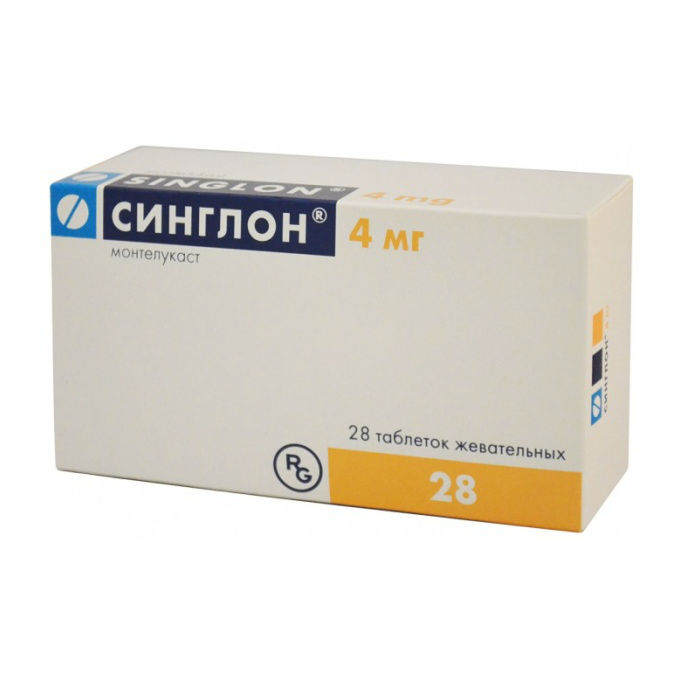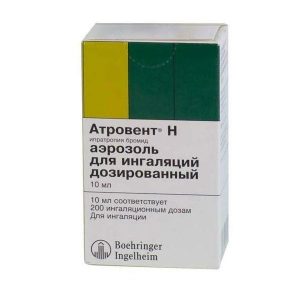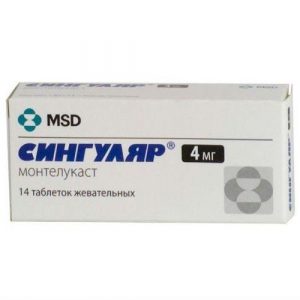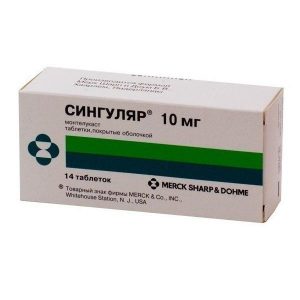Description
Release form
Tablets.
Packing
28 pcs.
Pharmacological action
Singlon is a blocker of cysteinyl leukotriene receptors CysLT1 (leukotrienes C4, D4 and E4 are mediators of chronic persistent inflammation that supports bronchial hyperreactivity in asthma).
Prevents excessive secretion in the bronchi, swelling of the mucous membrane of the respiratory tract. Reduces the severity of bronchial asthma and the frequency of asthmatic attacks. Highly effective when taken orally.
Bronchodilator action develops within 1 day and lasts a long time.
Effective in patients with mild persistent asthma, not sufficiently controlled by bronchodilators alone.
Contraindications
Hypersensitivity, children’s age (up to 6 years).
Caution. Pregnancy, lactation.
Special instructions
The effectiveness of montelukast for oral administration in the treatment of acute attacks of bronchial asthma has not been established. Therefore, Montelukast for oral administration is not recommended for the treatment of acute attacks of bronchial asthma. Patients should be instructed to always have emergency medications with them to relieve asthma attacks (short-acting inhaled beta2-agonists).
You should not stop taking montelukast during an exacerbation of asthma and the need to use emergency drugs (short-acting inhaled beta2-agonists) to stop attacks.
Patients with a confirmed allergy to acetylsalicylic acid and other NSAIDs should not take these drugs during the treatment with montelukast, since montelukast, while improving respiratory function in patients with allergic bronchial asthma, nevertheless cannot completely prevent bronchoconstriction caused by them.
The dose of inhaled GCS used concomitantly with montelukast can be gradually reduced under the supervision of a doctor, however, abrupt replacement of inhaled or oral GCS with montelukast cannot be performed.
Neuropsychiatric disorders have been described in patients taking montelukast. Considering, that these symptoms could be caused by other factors, it is not known whether they are associated with taking montelukast. The physician needs to discuss these side effects with patients and / or their parents / guardians. Patients and / or their guardians need to be explained that in case of the appearance of such symptoms, it is necessary to inform the attending physician about this.
Reducing the dose of systemic corticosteroids in patients receiving anti-asthma drugs, including leukotriene receptor blockers, was rarely accompanied by the appearance of one or more of the following reactions: eosinophilia, rash, worsening pulmonary symptoms, cardiological complications and / or neuropathy, sometimes diagnosed as Charge-Strauss syndrome , systemic eosinophilic vasculitis. Although a causal relationship between these adverse reactions and therapy with leukotriene receptor antagonists has not been established, caution should be exercised with a corresponding clinical observation when the dose of systemic corticosteroids is reduced in patients receiving Montelukast.
Composition
1 tablet contains 4 mg montelukast.
Dosage and administration of
Singlon taken orally, regardless of food intake.
Adults and teenagers over 15 years of age – 10 mg once a day, at bedtime.
Children 6-14 years old – 4 mg / day.
Side effects
From the side of the blood coagulation system: increased tendency to bleeding.
From the side of the immune system: hypersensitivity reactions, incl. anaphylaxis is very rare (
From the psyche: agitation (including aggressive behavior or hostility), anxiety, depression, disorientation, pathological dreams, hallucinations, insomnia, irritability, anxiety, somnambulism, suicidal thoughts and behavior (suicide), tremor
From the nervous system: dizziness, drowsiness, paresthesia / hypesthesia is very rare (<1/10 000) - cramps. From the cardiovascular system: tachycardia. From the respiratory system: nosebleeds, infections top their airways. From the digestive system: diarrhea, dyspepsia, nausea, vomiting, pancreatitis, increased activity of ALT and ACT in the blood is very rare ( From the skin and subcutaneous tissues: tendency to form hematomas, erythema nodosum, erythema multiforme, pruritus, rash. Allergic reactions: angioedema, urticaria. From the musculoskeletal system: arthralgia, myalgia, including muscle cramps. From the body as a whole: asthenia (weakness) / fatigue, edema, pyrexia. Drug Interactions When used simultaneously with phenobarbital, AUC of montelukast decreased by about 40% (correction of montelukast regimen is not required). In vitro studies have found that montelukast inhibits the CYP2C8 isoenzyme, however, when studying the drug interaction in vivo of montelukast and rosiglitazone (metabolized with the participation of the CYP2C8 isoenzyme), there was no confirmation of the inhibition of the CYP2C8 isoenzyme by montelukast. Therefore, in clinical practice, the effect of montelukast on CYP2C8-mediated metabolism of a number of drugs, including paclitaxel, rosiglitazone, repaglinide. Montelukast is a reasonable supplement to monotherapy with bronchodilators, if the latter do not provide adequate control of bronchial asthma. Upon reaching the therapeutic effect of treatment with montelukast, a gradual reduction in the dose of bronchodilators can begin. The use of montelukast provides an additional therapeutic effect in patients receiving inhaled corticosteroids. Upon reaching stabilization, You can start a gradual decrease in the dose of corticosteroids under the supervision of a doctor. In some cases, the complete cancellation of inhaled GCS is acceptable, however, a sharp replacement of inhaled corticosteroids with montelukast is not recommended. Overdose No specific information is available on the treatment of overdose with Singlon. Data on overdose symptoms when taking the drug in adult patients with asthma in a dose exceeding 200 mg / day. for 22 weeks and at a dose of 900 mg / day. within 1 week not detected. There have been cases of acute overdose of montelukast in adults and children at a dose above 1000 mg (approximately 61 mg / kg for a child aged 42 months). Clinical and laboratory results were consistent with the safety profile for adults and pediatric patients. The most common adverse events were consistent with Montelukast’s safety profile and included abdominal pain, drowsiness, mydriasis, thirst, headache, vomiting, and psychomotor hyperactivity. There is no evidence of the possibility of eliminating montelukast during peritoneal dialysis or hemodialysis. Storage Conditions Keep the product out of the reach of children, in a dry, dark place at a temperature not exceeding 25 ° C. Expiration 2 years. active substance Montelukast Terms of dispatch from pharmacies Prescription




